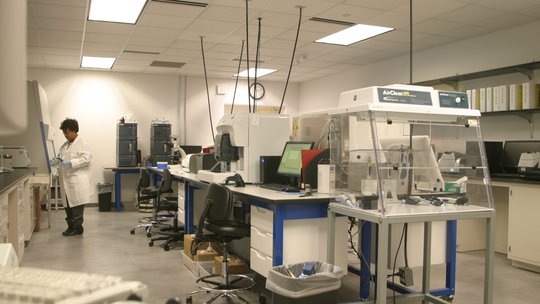
Minnesota is often touted as a life sciences hub, but that startup ecosystem can't shake one major challenge: There's not enough space.
A few incubators with appropriate lab space exist through the region, including University Enterprise Laboratories in St. Paul, Incubology in Oakdale, and Discovery Square in Rochester. However, leaders in the ecosystem say those locations are often packed or have a rotating waiting list.
The space challenge leads to a few issues. It’s hard for entrepreneurs to establish a company to develop their technology, and startups struggle to graduate into bigger locations and scale up, slowing the growth of the overall ecosystem. Some move to other states.
“It's really kind of a bottleneck,” said Jay Beyer-Kropuenske, director of operations at UEL. “That also keeps other startups from actually being able to move in the laboratory space and do more work, because it just isn't available.”
UEL, a nonprofit able to subsidize space for those with tight margins, currently houses 58 startup companies and has a small list of about a half dozen virtual tenants that it helps with grant writing and funding.
The list of interested parties is long at UEL, Beyer-Kropuenske said, but about five startups on the waiting list could move in immediately if space opened. A couple of current tenants would be ready to graduate almost immediately if a larger space existed somewhere.
The bottleneck makes storytelling more difficult for startups, too. When funders ask them about their growth strategy, they hit a physical and figurative wall. They’re stuck between wanting to fund their technology and needing money to build out something larger, which can be a staggering expense and time-sink for a scrappy team.
Frank Jaskulke, vice president at Medical Alley, describes Minnesota’s biotech ecosystem as “ready to burst onto the scene.” He said if that bottleneck can expand, it will build momentum and open space so the rest of the startups can scale more quickly.
“The impact is just that we grow slower,” he said of the lack of space. “We should be growing really fast in creating high-paying jobs that are good for different skill levels.”
Beyer-Kropuenske said landlords and developers are hesitant to build out lab space without a list of tenants ready to move in. However, drawing private capital has proven difficult — especially with continued tumult in capital markets. The success stories of the current spaces often come with a wide range of public and private funds.
Michael Flynn, senior director of economic development with Rochester’s DMC, said One Discovery Square is totally full and Two Discovery Square is still in the process of build out. One of his greatest focuses now is to build momentum and visibility for Rochester's story.
"We have the ingredients here that if we can pull all this together, it could be pretty remarkable what we can do," he said.
Jessica Mogilka, an executive vice president at JLL’s Minneapolis office and a UEL board member, tried opening her own spot to offer space in Minneapolis to startups in the life sciences. When Silicon Valley Bank failed, she couldn’t pencil out her North Loop Labs project. She said it's one example of the difficulty developing these projects amid challenging capital markets, especially in the new asset class of life sciences real estate. She hopes to try again in a year or two.
To her, a key solution is for those in the ecosystem to amplify the story of life sciences real estate to the larger market. It's "starting to get really good traction" and she said the conversations are reaching the ears of developers and investors. Coalition-building is also key, as proven by the success of UEL and DMC. Boston Scientific’s $170 million investment in Maple Grove is one example of how big players are paying attention.
“All of those pieces coming together start telling a story that developers and investors are interested in,” Mogilka said. “We need the private market to show up.”



